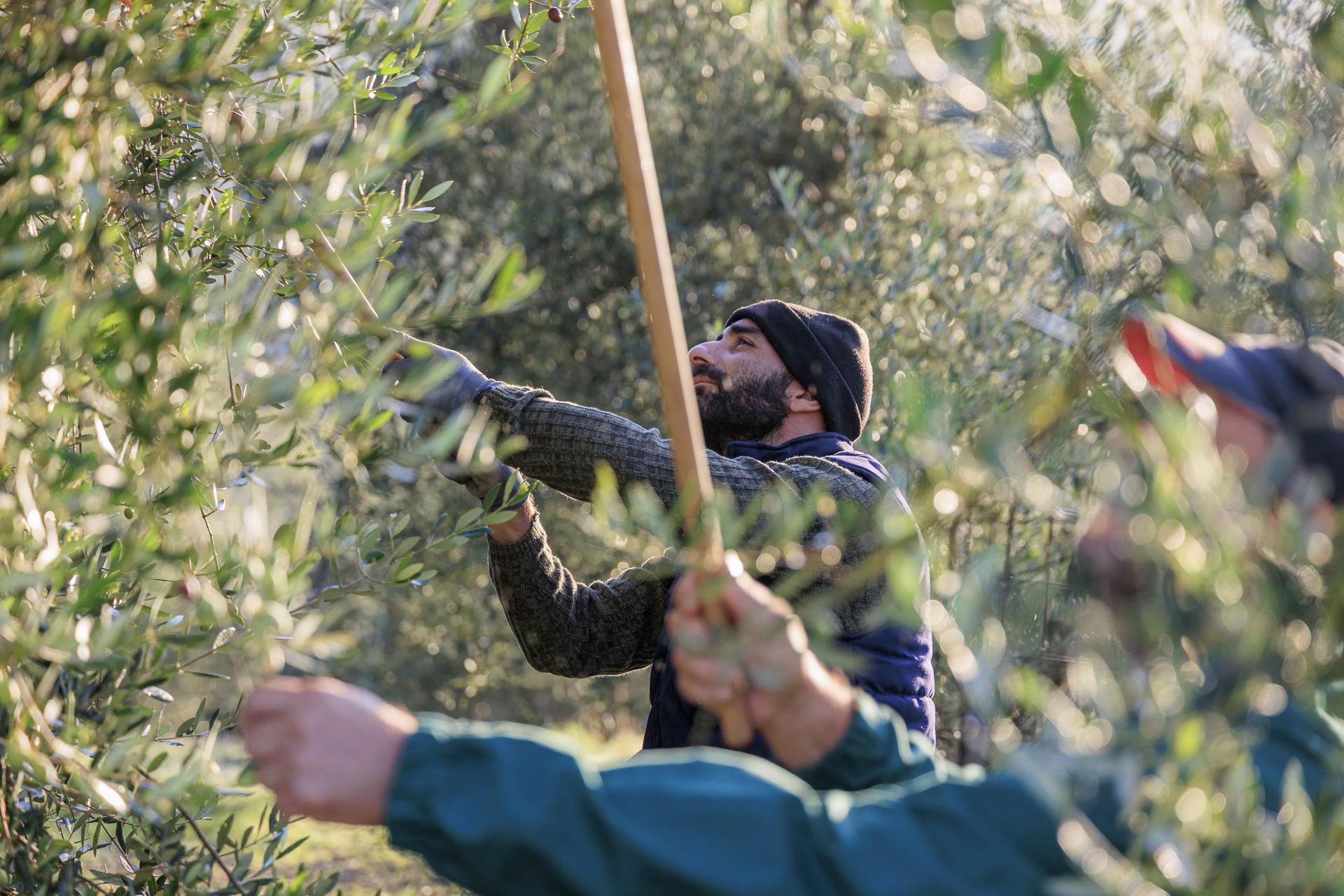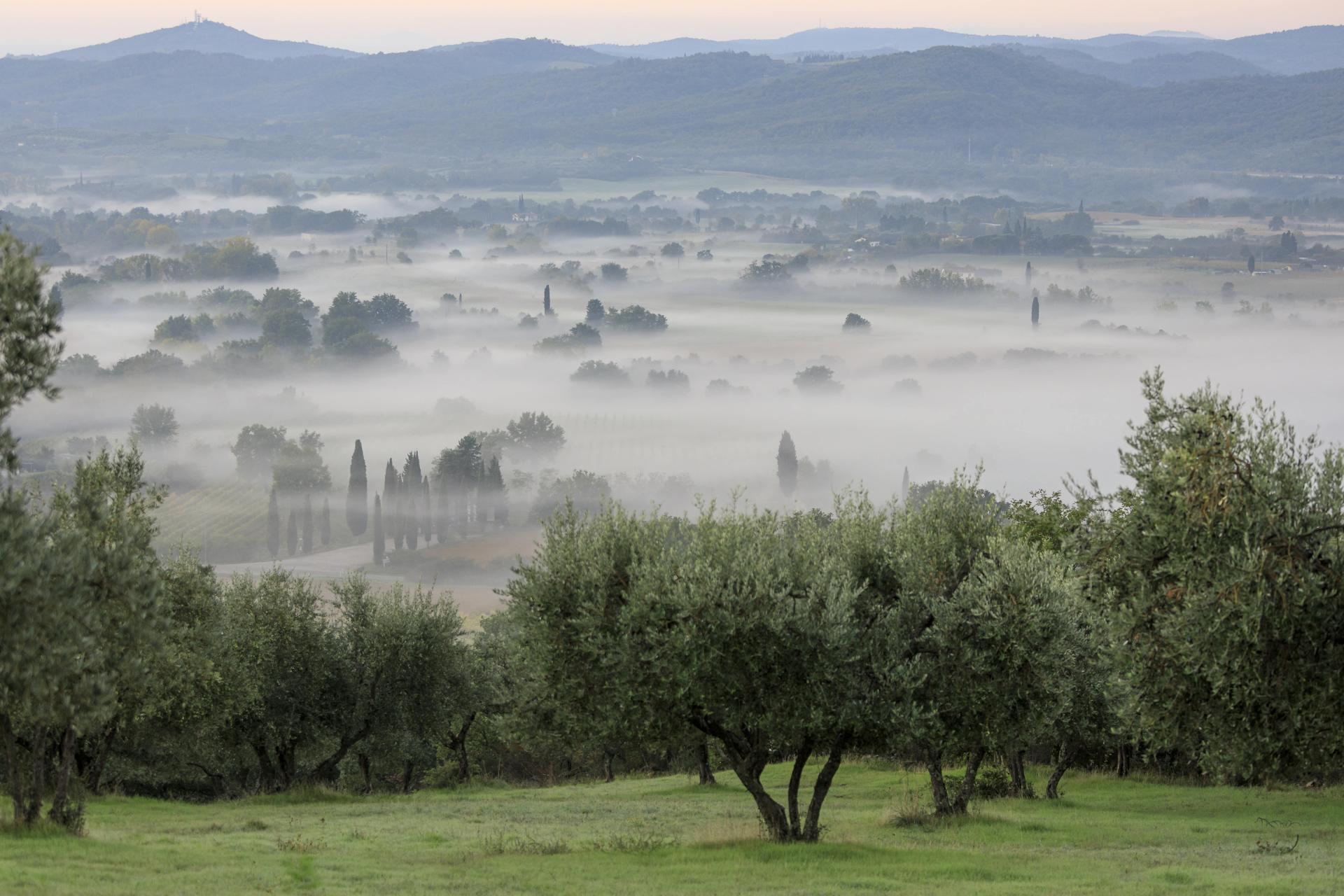Generosity, as a philosophy and as a practice
Over the course of our week at the flourishing farm in Italy, we came to see generosity as the storyline that compelled us the most. Generosity—as a philosophy and as a practice—threaded together our experiences at La Vialla.
We felt it from the moment we arrived in Tuscany. We were still sweaty from the long train ride when we were welcomed into one of the many farm houses tucked away in the woods. The Dutch family staying in the same villa as us invited us over for a sprawling supper of white beans stewed in porcini mushrooms and ribbons of zucchini kissed in a cloud of parmesan. We ate on the balcony in the cool night air, and talked about creativity and family and spirituality. Walking home that night, we could only look at each other and laugh. How did we get here? To be welcomed so generously was an immense gift.

The land felt generous, too. We spent the week wandering through mossy forests bursting with porcini mushrooms and past water-wise gardens brimming with organic herbs. One afternoon, we walked to the lake on La Vialla and were moved by the abundance of catnip. After a dry summer that had plunged much of Italy into drought, to see fields of wild mint sending up pale purple flowers towards the sky was sweet relief. In the past year alone, Tuscany has weathered fierce rains that ripped the petals from the pollinator-friendly acacia plant, a rare late spring snow, and prolonged drought. That the catnip had come up was to us a call to continue to take good care of our shared home. It was a gift, and it wasn’t guaranteed.
When we reflect on our stay at La Vialla, we remember glasses of Spumante Rosé—the same juicy red as ripe rosehips—glowing in the afternoon sun. We think of walks through old-growth canopies blanketed in fallen chestnuts, cold plunges in the saltwater pool, sumptuous suppers with friends. We think of a sip of pepperoncini-infused olive oil so spicy it made us tear up and an hours’ long lunch overlooking a silvery gray olive grove.
And this is a part of the story. La Vialla is a sensuous space. You can feel it in every glass of wine and palmful of compost.
But it’s also a relational space and relationship—real relationship, the kind that is connective, messy, beautiful, possibility-rich—requires consistent care. In many ways, this commitment to caretaking is woven into the fabric of La Vialla. The farm itself was “retrieved from abandon and taken into safekeeping” by the Lo Franco Family more than forty years ago. In the decades since, the Lo Franco Family have worked with the La Vialla community to widen their circle of care. This has meant supporting surrounding farms in transitioning to biodynamic practices, showing up for the families of La Vialla farmworkers, and welcoming in guests with generosity and grace.

The shift towards kinder and more gentle agriculture
Although creating a culture of care is integral to La Vialla’s ethos, the work of caretaking isn’t easy. Over the course of our stay, we respected La Vialla’s transparency in navigating the realities of agroturismo, biodynamic farming, and food production in the face of sociopolitical turmoil and climate crisis. With biodynamic farming, for example, preventative measures are critical–a problem is a problem. You have to learn how to read the land to do what’s needed to safeguard the soil.
Climate change, however, has made it far harder to work with the cycles of the seasons. Like so many farmers throughout the world, La Vialla is having to learn how to adapt to, and work with, a warming Earth. Although La Vialla is very much rooted in tradition—from their landscape that communicates Tuscany’s rich cultural heritage to their nutrient-dense foods drawn from regional recipes—they are aware too that the collective moment we are living through is asking for adaptation and imagination.
This is part of why their commitment to supporting surrounding farms in transitioning to biodiverse landscapes is such a vital step in cultivating resilience. It not only protects against pesticide drift, but it also feeds a necessary culture shift towards a kinder and more gentle agriculture.
This orientation to community as compass manifests in La Vialla’s commitment to creating a circular economy, too. On a micro scale, this looks like shepherding sheep that provide dairy for pecorino cheese, manure for compost, and meat for guests. It looks like wrapping their cheese in sediment leftover from pressing olive oil and conserving the wildflowers within their grain. On a macro sale, it looks like situating La Vialla within a greater web of relationality. Their family fund’s work converting abandoned farmland into thriving ecosystems is an investment in the belief that we are stronger together.
The grains, grapes, olives, and fruits that the La Vialla crew transform into luscious comestibles are hand harvested, hand pressed, hand milled, handmade. Doing so many things by hand is a way to lovingly tend to the land, and to maintain culturally relevant traditions—but it’s also a tool for communicating care. Our hands—and by extension our labor, our love—help root us to place and to people. You know when something is handmade, when someone has poured their body and breath into the food you eat and the land you are on.
Recentering connection to our earth and each other
Biodynamic farming thrives through balance. If you are a biodynamic farmer, your work is to create the conditions for the plant to take care of itself. You do what you can—lovingly, daily—to nourish the soil and the systems that make life more possible.
But finding balance means forfeiting control and constancy for fluidity. You can’t hold too tight to dogma. More than anything, finding balance means showing up with generosity of spirit. You have to take care of others, to share what you learn, what you make, what you grow because that is the work. La Vialla embodies this ethos to their core.
Supporting and sustaining land-based projects that seek to recenter connection to our earth and to each other is hard work. In continuing to come home to community, however, La Vialla is choosing to orient toward collective caretaking—of our soil, of our spirits—especially in the face of instability and uncertainty. Because the more you center your focus on creating a culture of care based on the regenerative patterns all around you, you can be certain life will continue to flourish.
Photos courtesy of Ruben Drenth and Hetty van Oijen